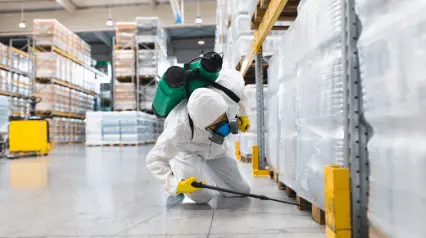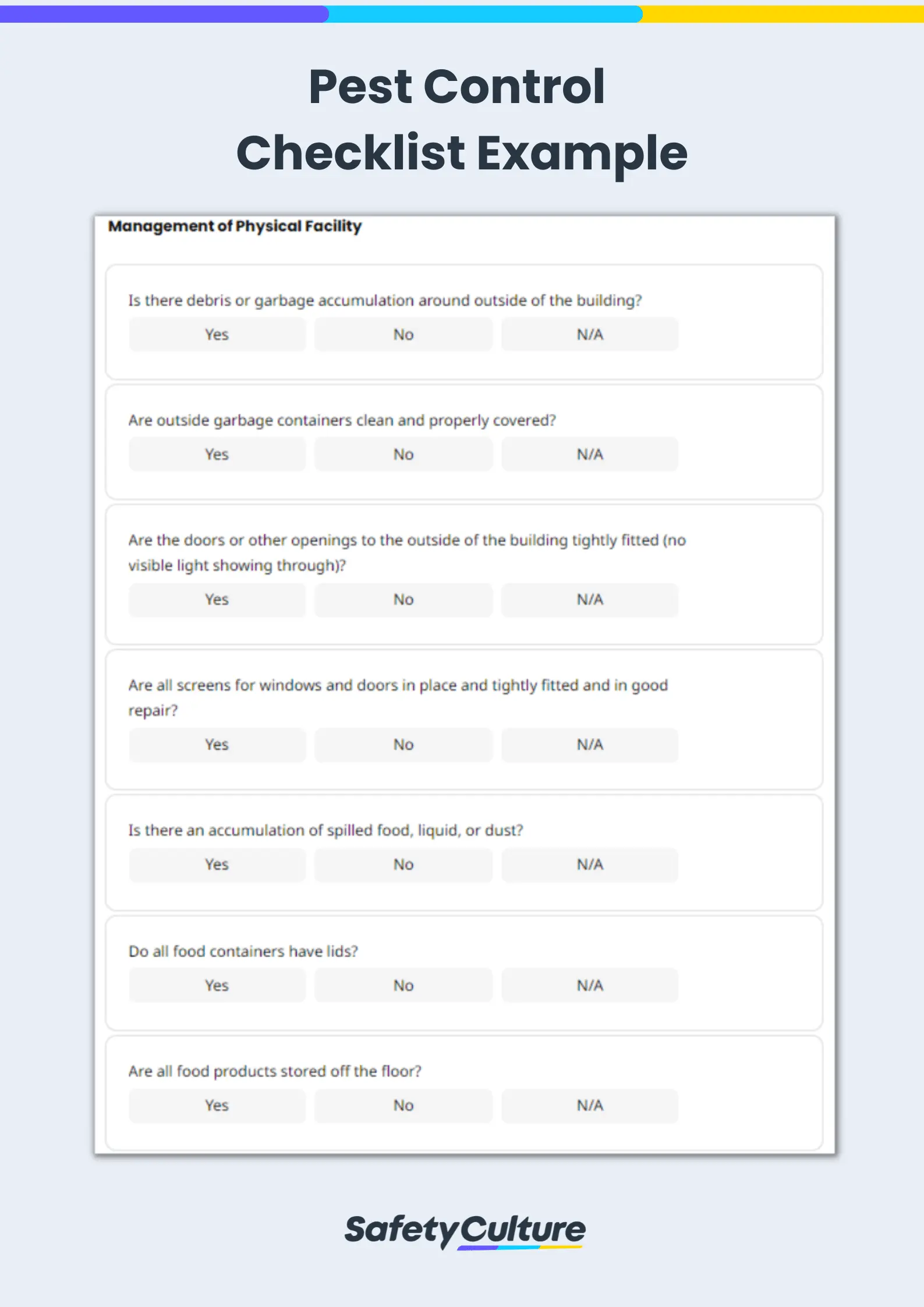What is a Pest Control Inspection Checklist?
A pest control inspection checklist is a tool that professionals can use when performing their inspections. This document normally includes all the essential areas in a property to assess the presence of pests, identify potential entry points, and determine the extent of infestation in a particular property.
What is a Pest Control Inspection?
A pest control inspection is a procedure carried out by licensed individuals to inspect building structures to determine pest activity and identify causes of infestation. This procedure also aims to foresee areas that are most likely to be root causes of pests. These destructive species will multiply exponentially and lead to damage to property that is expensive, irreparable, or both. Performing regular pest control inspections and maintenance will effectively keep out unwanted guests such as termites, ants, cockroaches, and more.
Who is Responsible for Pest Control?
Residential and building owners can schedule pest control at their own leisure. However, this is a necessary process for a property that is marketed to potential buyers or lessees. Landowners won’t be able to sell a property with present problems while landlords are required to maintain it, both of them have to make sure that the place is safe and livable for future occupants. They are legally responsible for efforts such as pest control.
What to Include in a Pest Control Inspection Checklist
Here are the list of items that are typically included in a pest control inspection checklist:
- Site/location
- Date and time of inspection
- Name of inspector
- Presence of possible pest causes in the facility
- Evidence of pests
- Customization for each area, such as exterior, interior, basement, and attic, among others
Pest Control Inspection Checklist Examples
A pest control checklist is a tool that can assist inspectors during property inspections. It can help identify or look for signs of pest activity and determine whether these areas have signs or evidence that pests are nesting and need treatment. Here are some related checklists that can help control the presence of pests in different industries:
A termite inspection checklist is used to find evidence of termite infestation. It helps inspect the critical areas, different points of entry, and exterior and interior of the property. It is used to proactively catch an infestation before more serious damage takes place.
A bed bug report is prepared by professional bed bug exterminators, facility maintenance personnel, or housekeeping staff members to provide a comprehensive room inspection report. It helps assess the facility for signs of infestation and provides recommendations to take swift action to resolve the issue before it turns into a full-blown infestation.
A food safety checklist is used to monitor employees if they are following food safety procedures to ensure goods are properly stored, handled, and prepared. It aids facility teams in assessing business’ compliance with food safety regulations to prevent any food contamination due to rodents or other pests.
Commercial Kitchen Cleaning Checklist
A commercial kitchen cleaning checklist is used to assess if a commercial kitchen follows standard cleaning protocols. It aids kitchen managers during inspections to ensure kitchen equipment is properly cleaned and sanitized before and after use.
Agriculture Safety Inspection Checklist
An agriculture safety inspection checklist is designed to check the health and safety programs, workplace conditions, and hazards specific to farms and ranches. It helps monitor if pesticides are used according to good application practices.
A home inspection checklist aids home inspectors when performing a visual check of the entire property. It helps to thoroughly inspect the property including grounds, structure, exterior, roof, windows, doors, interior, rooms, and other sections of the home.
A hotel room checklist is used by housekeeping staff to maintain the guest room’s cleanliness. It helps ensure mattresses and couches are free from bed bugs and all items in the room are operational.
A PPE inspection checklist is used to select the appropriate equipment to reduce hazards identified at work. It would help ensure PPE will last for a long time with minimum degradation. It aids pest control professionals to comply with safety regulations.
Chemical Handling, Storage and Disposal Checklist
This checklist is used to ensure employees are following proper handling, storage, and disposal of hazardous chemical substances. It helps assess whether employees are trained in safe procedures when working with hazardous chemicals.
Pest Control Inspection PDF Sample Report
This sample pest control PDF report contains every section of the checklist form and also highlights the failed items during the pest control inspection.
Pest Control Software: 4 Ways It Can Boost Your Business
Digital technology has significantly changed the everyday workflow of pest control inspectors, leading to the improvement of many processes. One of the most game-changing investments for pest inspection firms has been the acquisition and integration of pest control software.
Keen to know how pest control business software can make an impact on your operations? Here are 4 ways it can provide that boost:
1. Productive Inspectors are Happy Inspectors
To help keep inspectors happy, opportunities to free up their time should be identified so they can provide quality service to more clients. With pest control software, there’s a big opportunity to provide just that.
The pest control software can help streamline inspection tasks, such as job scheduling, report generation, and assignment of action items. This automation saves inspectors precious time and eliminates the need to go back to the office to collate information; instead, they can use this time to thoroughly discuss findings with clients and build rapport.
2. Make Standardization Easy
Best practices in pest control inspection continually evolve, and with that comes the cumbersome practice of updating and reprinting inspection forms. Digital forms, such as pest control inspection checklists and work orders, can be built via the pest control software; this can make standardization of inspection templates more convenient as you’ll only need to update and publish a common template to get everyone on the same paperless page.
3. Distinguish Your Business by “Going green”
Like it or not, prospective clients are concerned about how “green” your pest control service is. From the pesticides and herbicides used to your backend processes, eco-conscious customers will investigate how you practice green pest control.
4. Strengthen Preventive Efforts With Improved Data Management
When it comes to preventative pest management, a strong foundation for data collection and recordkeeping is vital. Pest control software transforms your inspection data into insightful information. You can easily gather details, such as the seasonality of pests and the most common causes of pest infestations. You can then utilize this knowledge and use the pest control scheduling software to set appointments with clients for the implementation of preventive measures.
Technology is rapidly changing the pest control industry; with pest control software, you can ensure that your business does not get left behind. It helps you be more efficient in conducting pest control inspections, responding to business insights, and utilizing information to improve the quality of service—resulting in customer satisfaction and retention.




